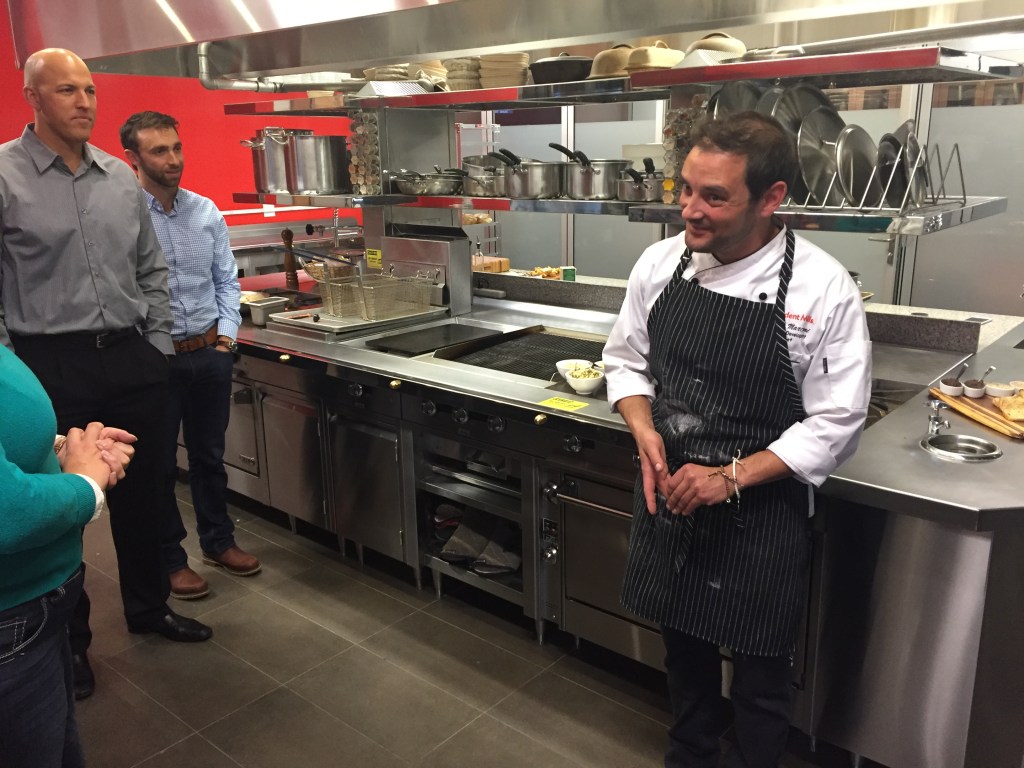Meet the Denver doctor on a hilarious, heartfelt search for the healing ingredient in health care.
“Do you remember our handshake? The Nussbaum handshake? First you slap, then you shake, then you slide! It’s the Nussbaum sandshake, the Nussnutt landrake, the Fussbutt bandlake, the Cussbutt taketake!”
Martha, a retired nurse battling depression, found herself once again on the psych unit under the care of Dr. Abraham Nussbaum, a psychiatrist at Denver Health and author of a new memoir, The Finest Traditions of My Calling: One Physician’s Search for the Renewal of Medicine. After years of hospitalizations, Martha formalized her affection for Dr. Nussbaum with “the dreamshake.” Slide and shake, pinky swear, fist bump, explosion.
But why the dreamshake? What did Martha dream about her doctor? Was he a scientist, friend, lover, pill-provider, teacher, technician—or savior?
In a mammoth industry—in 2014, $3 trillion, or $9,523 per American, was spent on health care—competing visions for reform abound. Nussbaum, a 41-year-old Catholic physician, ushers readers through a wild, weird, head scratching, infuriating, and tender odyssey into the dizzying diversity of modern medicine.
Part journalist, part comic, part philosopher, and part shrink, Nussbaum’s search for the healing of healthcare culminates not with the wonders of technology or a recipe for cost-saving, but instead with a fourth-century bishop’s call to build a “poor house” for the ill.
Comedy and Tragedy
On the second day of med school, a young female pathology resident grabbed lunch from the cafeteria and accompanied Nussbaum to his first autopsy. She casually chatted while cutting open an elderly man’s chest—opening the rib cage, removing the organs, and plopping intestines into the sink before she “ran the bowel,” spilling out feces.
As guts spilled out of the cadaver, Nussbaum asked if she ever considered vegetarianism. “No,” she said. “Why would you ask?”
For Nussbaum, residency began by learning how to handle dead body parts; it eventually grew to learning how to handle co-workers.
As a third-year resident, Nussbaum (the rookie) shadowed Cannon, an intern with small glasses, curly hair and pearly teeth. Around three in the morning, a nurse paged them about a patient with a case of the hiccups.
“Okay, Rook, look up treatments for intractable hiccups,” Cannon said.
“Chlorpromazine. Haloperidol. Methylphenidate. Baclofen. Midazolam. Rectal massage.”
“What was that last one?”
“Rectal massage.”
“Uh-huh. That’s the one. Rook, let me teach you. You’ve got to show the nurse who’s in charge.”
The furious nurses massaged the patient’s rectum every 15 minutes the entire night—and made sure to page Cannon mercilessly for the next half decade while on call.
It’s hard to say whether the physicians, the patients, or the consultants in The Finest Traditions of My Calling are more entertaining.
Dr. Paul Bregman, one of Colorado’s many marijuana doctors, arrives to lunch wearing Air Jordans, tweed pants, and a black t-shirt, and tries to offer Nussbaum a bag of cannabis-infused Ho-Hos (“I want you to see the amazing”). Connie, a patient who is sure her sister is plotting to harm Peyton Manning, won’t relent until the star quarterback visits her in treatment. A team of health care consultants prints t-shirts with the new hospital motto. They get tossed from floor to floor by underwhelmed doctors and nurses, and eventually worn by wild-eyed patients on the third-floor psych unit who could uniquely identify with the new slogan: “I’M COMMITTED.”
Yet the comedy of medicine often gives way to the tragic.
Bao was a 43-year-old Vietnamese immigrant who regularly visited the emergency department reporting chest pain, suicidal thoughts, and anxiety. She felt “as lonely as an empty cup.” One night, Bao, a self-described virgin, requested birth control pills. When asked why, she said, “I met a man.”
“Can you tell me about him?”
“My car broke down on the highway. I was on the side of the road and a police officer helped me call a tow truck. Then he told me he was separated from his wife and wondered if we could get together some time. For sex. He told me he liked Asian ladies.”
The internist had prescribed Ortho Tri-Cyclen for birth control, but had missed Bao’s real story completely.
“The value of experience,” said Sir William Osler, founder of the Johns Hopkins University School of Medicine, “is not in seeing much, but in seeing wisely.” Has modern medicine reduced people to “parts and money,” billing patients for defective limbs or organs, yet forgotten to cultivate deeper virtues?
Amidst such a circus, where does one look to discover and “to preserve the finest traditions of my calling,” to which the Hippocratic Oath refers?
The World’s First Hospital
While enrolled in an AmeriCorps program after college, Nussbaum lived at a Dominican priory. One night, he arrived for mandatory vespers for hymn singing. They cracked open their hymnals to the 72nd Psalm,
“He will rescue the poor at their call,
those no one speaks for.
Those no one cares for
he hears and will save.
He saves their lives from violence,
lives precious in his eyes.”
Having just seen Francisnek, a homeless Polish immigrant whose sobriety was the boast of the rescue mission, slip back into alcoholism, Nussbaum longed for the fulfillment of the psalmist’s promise.
In contrast to the scotch-sipping, sitcom watching friars, the Sinsinawa Dominicans, their sister community down the road, “seemed strangely alive in the absence of men.” One nun handed Nussbaum a “holy card”—like a baseball card for Catholics—of two saints, Cosmas and Damian, “Physicians and Martyrs” who promised to turn their bearers into “willing and loving servants.” Considering the call to medicine, Nussbaum’s pilgrimage took him to Duke University, to study the history of medicine under theologian Stanley Hauwerwas.
In the ancient Greek tradition, sick people came to the temple of Asclepius, the Greek god of medicine, and offered gifts in exchange for health. Likewise, Greek doctors saw only those who could pay, and there was no public duty toward the sick. But the Jewish tradition of hospitality and the Christian tradition of charity to the poor birthed a new, public commitment to the ill.
In 370, Basil, the new bishop of Caesarea, built a ptochotropeion, or house for the poor, ill, and dispossessed. Located on city’s edge, so it would be accessible especially to travelers and strangers, clerics, deacons, and lay physicians gave patients rest, meals, and care. Basil believed Christians were responsible for the social welfare of the entire city, not only the wealthy. Many scholars today consider Basil’s ptochotropeion to be the first hospital in Western society, the foundation of public-health efforts, and the historical inspiration behind hospitals for the indigent ill in cities throughout the West.
Denver Health, where Nussbaum practices medicine today, descends from Basil’s vision, however loosely. Outside the hospital is a bench, cut from stone, that reads “DO JUSTICE. LOVE GOODNESS. WALK HUMBLY.” The omission of God’s name from the prophet Micah’s famous injunction is both a symbol of medicine’s forgotten origin and a testimony to longings for a deeper, more soul-satisfying vision of the physician’s vocation.
Each morning, when Nussbaum’s arises from bed, he gazes upon an image of Basil of Caesarea. “To place the hope of one’s heath in the hands of the doctor is the act of an irrational animal,” wrote Basil. But “when reason allows, we call in the doctor, but we do not leave off hoping in God.”
Engagement with Faith
The Finest Traditions of My Calling is a sparkling, heart-wrenching, hilarious success.
Even when critiquing quality improvement experts, the narrative still charms. Nussbaum once compares Atul Gawande’s New Yorker essay on “Big Med,” which promises healthcare will be saved by becoming like aircraft carriers or assembly-line restaurants, to “Famous Factory Meatloaf” produced at the Cheesecake Factory.
Yet it’s his serious and delightful engagement with Christianity that really elevates the book. He praises Hildegard of Bingen, a medieval abbess, musician, mystic, and pre-modern clinician, for gently nursing both gardens and patients back to health. Dr. Paul Farmer, founder of Partners in Health, advocates an application of liberation theology to health care, and opens clinics for the impoverished from Malawi to Peru to Russia. Nussbaum suffers alongside of one of his patients, Eleanor, who struggles to believe in a God who let her mother die of cancer.
Most books on medicine either completely ignore Christianity (and assume medicine started in the 20th century) or see it as a tactic for converting patients. But here, faith is a surprising source of hope. Though Nussbaum doesn’t claim to be a “Catholic psychiatrist,” (he unconvincingly claims to be a “bad Catholic” in the vein of the novelist Walker Percy), his Christian commitments shine through with the humility of St. Luke the Physician.
Yet perhaps Nussbaum’s greatest triumph is turning a medical memoir, a genre that can inspire intractable cases of yawning, into an accessible adventure for a general audience, one worthy of a sequel or even a film adaptation.
Weeks after finishing the book, my daughters are still asking me to do the Nussbaum handshake.
This book review first appeared on christianitytoday.com.


 Conventional fund managers look for financial strengths in making investment decisions, John says. The problem is that profitability is a lagging indicator. It tells investors more about the past than the future. Moreover, it doesn’t show how a business made that money, whether through quality products or oppressive business practices.
Conventional fund managers look for financial strengths in making investment decisions, John says. The problem is that profitability is a lagging indicator. It tells investors more about the past than the future. Moreover, it doesn’t show how a business made that money, whether through quality products or oppressive business practices.
























